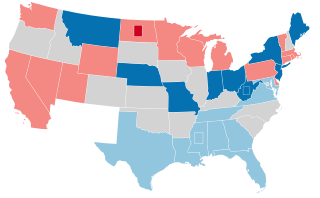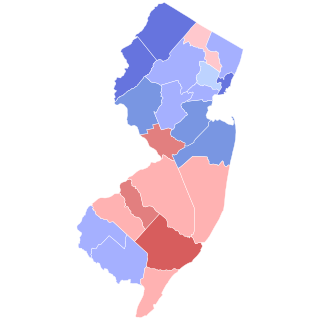
Nia H. Gill is an American attorney and Democratic Party politician, who represented the 34th Legislative District in the New Jersey Senate from 2002 to 2024. She ran unsuccessfully as a candidate in the June 2012 primary election to fill the seat in Congress left vacant by the death of Donald M. Payne, the former U.S. Representative for New Jersey's 10th congressional district. Gill was the State Senate President pro Tempore from 2010 to 2018, succeeded by Teresa Ruiz.

The 1912–13 United States Senate elections were held on various dates in various states. They were the last U.S. Senate elections before the ratification of the Seventeenth Amendment in 1913, establishing direct elections for all Senate seats. Senators had been primarily chosen by state legislatures. Senators were elected over a wide range of time throughout 1912 and 1913, and a seat may have been filled months late or remained vacant due to legislative deadlock. Some states elected their senators directly even before passage of Seventeenth Amendment. Oregon pioneered direct election and experimented with different measures over several years until it succeeded in 1907. Soon after, Nebraska followed suit and laid the foundation for other states to adopt measures reflecting the people's will. By 1912, as many as 29 states elected senators either as nominees of their party's primary or in conjunction with a general election.

The 1910–11 United States Senate election were held on various dates in various states. As these U.S. Senate elections were prior to the ratification of the Seventeenth Amendment in 1913, senators were primarily chosen by state legislatures. Senators were elected over a wide range of time throughout 1910 and 1911, and a seat may have been filled months late or remained vacant due to legislative deadlock. However, some states had already begun direct elections during this time. Oregon pioneered direct election and experimented with different measures over several years until it succeeded in 1907. Soon after, Nebraska followed suit and laid the foundation for other states to adopt measures reflecting the people's will. By 1912, as many as 29 states elected senators either as nominees of their party's primary or in conjunction with a general election.

The 1970 United States Senate election in New Jersey was held on November 3, 1970. Incumbent Democrat Harrison A. Williams defeated Republican nominee Nelson G. Gross with 54.02% of the vote.

The 2013 United States elections were held on Tuesday, November 5, 2013. This off-year election cycle featured several special elections to the United States Congress; two gubernatorial races; state legislative elections in a few states; and numerous citizen initiatives, mayoral races, and a variety of other local offices on the ballot.

The 1930 Pennsylvania gubernatorial election occurred on November 4, 1930. Incumbent Republican governor John Stuchell Fisher was not a candidate for re-election. Republican candidate and former governor Gifford Pinchot defeated Democratic candidate John M. Hemphill to win a second, non-consecutive term as Governor of Pennsylvania.

The 2013 United States Senate special election in New Jersey was held on October 16, 2013, to fill the New Jersey United States Senate Class 2 seat for the remainder of the term ending January 3, 2015. The vacancy resulted from the death of 5-term Democratic senator Frank Lautenberg on June 3, 2013. On June 4, 2013, New Jersey Governor Chris Christie announced that a primary election to fill the vacancy would take place on August 13, 2013, and that a special election would follow on October 16, 2013. Christie appointed Republican New Jersey Attorney General Jeffrey Chiesa to the seat as a placeholder; Chiesa announced at the time of his appointment that he would not be a candidate in the special election.
Carmine Robert Sarcone was an American Republican Party politician. He served in both houses of the New Jersey State Legislature, and sought the Republican nomination for Governor of New Jersey in 1977.

The 1973 New Jersey State Senate Senate elections were held on November 6. The result of the elections were large gains for the Democratic Party, which won control of the Senate. The party picked up twelve seats. This election marked the first time since 1967 that Democrats controlled the State Senate.
Essex County is New Jersey's largest county and its county seat, Newark, is New Jersey's largest city. Essex has been predominantly Democratic since the early 1970s. Essex was a politically competitive (swing) county for decades before that.

The 1913 New Jersey gubernatorial election was held on November 4, 1913. Democratic acting Governor James Fairman Fielder, who resigned a week before the election so that he could succeed himself, defeated Republican former Governor Edward C. Stokes and Progressive former state senator Everett Colby.

The Ohio general elections, 2018, were held on November 6, 2018, throughout Ohio.

The United States Senate election of 1916 in New Jersey was held on November 7, 1916.

The 1911 United States Senate election in New Jersey was held on January 24–25, 1911. Republican incumbent John Kean did not run for re-election to a third term. The open seat was won by Democrat James Edgar Martine with Republican former Governor Edward C. Stokes as the runner-up.

The 1914 United States Senate election in Colorado took place on November 3, 1914. It was the first direct U.S. Senate election in Colorado following the ratification of the Seventeenth Amendment. Incumbent U.S. Senator Charles S. Thomas, a Democrat, who was first elected by the state legislature to fill a vacancy in 1913, ran for re-election to a full term.

The 1918 United States Senate elections in New Jersey were held on November 7, 1918.

The United States Senate election of 1922 in New Jersey was held on November 7, 1922.

The United States Senate election of 1928 in New Jersey was held on November 6, 1928. Incumbent Democratic Senator Edward I. Edwards ran for re-election to a second term in office, but was defeated by Hamilton Fish Kean in a landslide. This was the third of four straight elections to this seat in which the incumbents were defeated.

The 1930 United States Senate election in Minnesota was held on Tuesday November 4, Incumbent Senator Thomas D. Schal defeated Einar Hoidale of the Minnesota Democratic Party and Forner United States Representative Ernest Lundeen of the Farmer–Labor Party of Minnesota to win a second term.

The 2001 New Jersey State Senate elections were held on November 6.





















